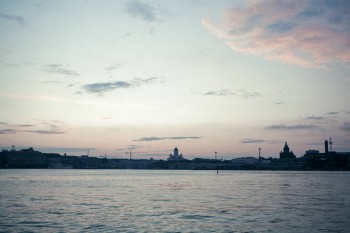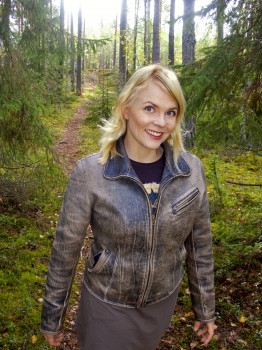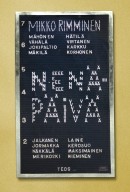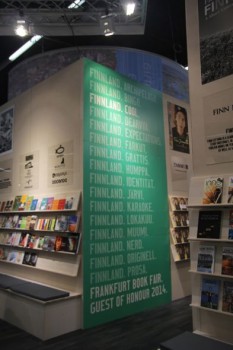Search results for "2011/04/2010/05/song-without-words"
Looking back on a dark winter
31 December 1989 | Archives online, Fiction, Prose
Extracts from the autobiographical novel Talvisodan aika (‘The time of the Winter War’), the childhood memoirs of Eeva Kilpi. During the winter of 1939–40 she was an 11-year old-schoolgirl in Karelia when it was ceded to the Soviet Union and the population evacuated
Time is the most valuable thing
we can give each other
War’s coming.
One day my father comes out with the familiar words in a totally unfamiliar way, while we’re sitting round the kitchen table eating, or just starting to eat.
He says to mother, as if we simply aren’t there, as if we don’t need to bother, or as if listening means not understanding. Or perhaps they’ve simply no other chance to speak to each other, as father’s always got to be off hunting, or on his way to the station, and mother’s always cooking. More…
The report
30 September 1984 | Archives online, Fiction, Prose
A short story from Kesä ja keski-ikäinen nainen (‘Summer and the middle-aged woman’) Introduction by Margareta N. Deschner
Dear Colleague,
First of all, I want to thank you and your wife for the pleasant evening I and my wife had in your summer villa in August. Briitta (since we are old acquaintances: with two i’s and two t’s, remember?) especially wants me to mention that she will never forget the half moon climbing the hill behind your sauna, surprising us with its speed. The next time we looked it was half-way up the sky! Without doubt, your fine tequila had something to do with the matter, one shouldn’t forget that. Even so, it was quite a show, just like the time a bunch of us guys had gone skiing and you bragged that you had arranged for the barn to catch fire. I hope that you and your wife – I mean Alli – will be able to visit us next winter and taste a superb Mallorca red wine called Comas, which we brought home. It is by far the best red I have ever tasted and indecently cheap to boot. I hope you will come soon. The wine won’t keep indefinitely, as you well know. We’ll save it for you. So thanks again.
Things
31 March 1997 | Archives online, Fiction, Prose
A short sory from Kaunis nimi (‘A lovely name’, Otava, 1996). Raija Siekkinen’s limpid prose is at its best when she explores the complex feelings that lie behind the events of everyday life. Here objects are indicators of emotions, memory and loss, and what is most important is left unsaid
And where was the pen, the fountain pen, black, chubby; the one which pumped the ink straight up from the bottle?
There were three gold-coloured bands on the cap of the pen, and its nib, too, was golden, It had been given to her in a case lined with black velvet, and there was a groove for the pen, and a depression for the ink-bottle; and the bottle was narrow -necked, with curving sides, and the ink in it was not bright blue, but dark, so that words written in it looked old, written a long time ago; one forgot that one had written them oneself, one read them like the words of a stranger.
She remembered the pen, and began slowly to wake up. More…
Lest your shadow fade
31 March 1987 | Archives online, Fiction, Prose
An extract from the novel Jottei varjos haalistu (‘Lest your shadow fade’, 1987). Interview by Erkka Lehtola
‘… learn, then, to like yourself.
Dancing beside your shadow, laugh and play.
Dance always in the sunlight, lest your shadow fade.’J. Fr. Erlander, 1876 (Erika Kuovinoja’s grandfather)
‘Tis in life’s hardness that its splendour lies.’
J. Fr. E., 1890
Three days before the date fixed for the funeral, the minister directed his steps towards the home of the deceased, trying, as he walked, to compose his thoughts, which were full of righteous Lutheran anger. There were many good reasons for this. On the other hand, nothing that had happened in the past ought to make any difference, now that he was on his way to visit a house of mourning. A visit that called for the exercise of understanding, and even, if possible, kindness. It was a lot for anyone to expect, even of a clergyman. It was not by his own desire that he was paying this call: it was a matter of duty. And this time he was the protagonist. Petulantly, his shoes crunched the gravel. More…
The ring
31 December 1998 | Archives online, Fiction, Prose
A short story from Irti (‘Away’, Gummerus 1998). Introduction by Milla Autio
When the car turns into the drive I know that this time it has happened. That this time it has not been for nothing that I have felt cold fear creep inside my stomach. And for a moment, as Vangelis gets out of the car and looks at me and Irini sighs deeply and grabs me as if for support, I feel nothing.
The landscape is the same, the trees and the burnt grass and the intoxicating scents of late summer. And the sounds, too, are the same; the merry cries of children farther off and the clatter of dishes from the kitchen. Later, of course, my landscape will shudder and quake from its place, fly on its way like disturbed papers. That was something you shouted at me about; other such incidents I do not remember, but when a gust of air from the door caught your papers you went mad. That moment is inscribed in my memory, caught there like the words on the pages of a book. More…
Letter to the wind
30 September 2002 | Archives online, Fiction, Prose
A short story from Haapaperhonen (‘The butterfly’, Gummerus, 2002). Introduction by Kristina Carlson
When Father comes to visit me, he sometimes sings a hymn. I can’t ask him not to. But when he doesn’t, I wonder why not, whether there’s something up with him. I can’t ask him to sing, but something is missing, the same thing that there seems to be too much of when he sings. It’s too much, but I miss it when it’s not there. I wonder about it after Father’s gone; my thoughts curl into dreams and I sleep.
When I sleep I don’t know I’m here, in a strange place. I’m at home, sleeping at home, in my own bed. The window is the right size, not too big like it is here; here there isn’t really a window at all, half the wall is missing and instead there’s glass. Behind a glass wall it’s not safe, everything is taken through it, including me. But sleep takes me to safety; I’m at home there. I breathe it peacefully. In the cabin there are two breathings, mine and Turo’s, and in the bedroom Father’s breathing. They are in no hurry to drive time away; time can linger, sleep, the moment of night, and when sleep withdraws there is no hurry either; I can sit in peace on the window seat and gaze at the cloudy, moonlit yard. The apple tree is asleep; it’s the only one. The fieldfares ate the apples before we could pick them, but it did not bother me or Father. It was good to look at the flock of fieldfares making a meal of the apple tree. Then they went away. More…
Locomotive
30 June 1981 | Archives online, Fiction, Prose
A short story from Dockskåpet (‘The doll’s house’). Introduction and translation by W. Glyn Jones
What I am about to write might perhaps seem exaggerated, but the most important element in what I have to tell is really my overriding desire for accuracy and attention to detail. In actual fact, I am not telling a story, I am writing an account. I am known for my accuracy and precision. And what I am trying to say is intended for myself: I want to get certain things into perspective.
It is hard to write; I don’t know where to begin. Perhaps a few facts first. Well, I am a specialist in technical drawings and have been employed by Finnish Railways all my life. I am a meticulous and able draughtsman; in addition to that I have for many years worked as a secretary; I shall return to this later. To a very great extent my story is concerned with locomotives; I am consciously using this slightly antiquated word locomotive instead of loco, for I have a penchant for beautiful and perhaps somewhat antediluvian words. Of course, I often draw detailed sketches of this particular kind of engine as part of my everyday work, and when I am so engaged I feel no more than a quiet pride in my work, but in the evenings when I have gone home to my flat I draw engines in motion and in particular the locomotive. It is a game, a hobby, which must not be associated with ambition. During recent years I have drawn and coloured a whole series of plates, and I think that I might be able to produce a book of them some time. But I am not ready yet, not by a long way. When I retire I shall devote all my time to the locomotive, or rather to the idea of the locomotive. At the moment I am forced to write, every day; I must be explicit. The pictures are not sufficient. More…
Two men in a boat
The meaning of life, Bob Dylan, the broken thermostat of the Earth, the authors Ambrose Bierce and Aleksis Kivi…. Two severely culturally-inclined men set out to row a boat some 700 kilometres along the Finnish coastline, and there is no shortage of things to discuss. Extracts from the novel Nyljetyt ajatukset (‘Fleeced thoughts’, Teos, 2014)
The red sphere of the sun plopped into the sea.
At 23.09 official summertime Köpi announced the reading from his wind-up pocket-watch.
‘There she goes,’ commented Aimo, gazing at the sunken red of the horizon, ‘but don’t you think it’ll pop back up again in another quarter of an hour, unless something absolutely amazing and new happens in the universe and the solar system tonight!’
Aimo pulled long, accelerating sweeps with his oars, slurped the phlegm in his throat, spat a gob overboard, smacked his lips and adjusted his tongue on its marks behind his teeth. There’s a respectable amount of talk about to come out of there, thought Köpi about his old friend’s gestures, and he was right.
‘Sure thing,’ was Aimo’s opening move, ‘darkness. Darkness, that’s the thing. I want to talk about it and on its behalf just now, now in particular, while we’re rowing on the shimmering sea at the lightest point of the summer. More…
Life is
16 February 2012 | Letter from the Editors

Helsinki silhouette. Photo: Valtteri Hirvonen, Eriksson&Company / World Design Capital Helsinki, 2011
Where is Books from Finland located?
In the old days, the answer was simple, although not unambiguous. Books came from its office in central Helsinki; it was written in various locations in Finland and abroad, and translated mainly in England and the United States; and it was published in the small town of Vammala, about 200 kilometres north of Helsinki.
It spread, in multiple paper copies, to readers throughout the world, to find its place on desks, on bedside tables, in briefcases and handbags, propping up table-legs or holding doors open – in London, England, Connecticut, New England, with a few in Paris, France, and Paris, Texas, maybe. More…
Poetry written aloud
20 May 2011 | Reviews

Heli Laaksonen. Photo: Otava/Irmeli Jung
In the 21st century, poetry written in various dialects has drawn new audiences to poetry readings. A common feature of, for example, Sinikka Nopola’s short prose about the family, written in the dialect of the Tampere area, and Heli Laaksonen’s poetry, which is written in the dialect of south-west Finland, is the enormous popularity of live performances by the authors. Their audiences love to hear them read in dialect, because the texts are funny, and they sound even funnier when read aloud.
Heli Laaksonen (born 1972) has, ever since her first collection, Pulu uis (‘Pigeon swimming’, 2000), been Finland’s best-selling poet. Her three collections and audio books have achieved sales figures that are astonishing in the Finnish context – tens of thousands of copies. Her fourth collection, Peippo vei (‘The chaffinch took it’, Otava, 2011), has been at the head of bookseller’s sales lists throughout March and April. More…
Mikko Rimminen: Nenäpäivä [Nose day]
29 October 2010 | Mini reviews, Reviews
 Nenäpäivä
Nenäpäivä
[Nose day]
Helsinki: Teos, 2010. 339 p.
ISBN 978-951-327-1
€ 25.90, hardback
Female protagonists as sympathetic as this are rare in contemporary literature; in this third novel by Mikko Rimminen (born 1975), Irma is a solitary, slightly awkward outsider who gets badly tangled up in a muddle of her own making. She poses as a door-to-door market researcher – in order to meet people. Rimminen employs a more complex plot than in his previous novels (his 2004 debut work, Pussikaljaromaani, ‘A six-pack novel’, about idle young men, has been translated into five languages). The author is an acknowledged master of the slow narration: he is skilled at describing the sound of silence and giving a page-long description of the behaviour of a mobile phone in someone’s hand. All that passes unsaid and unseen between people is cleverly and hilariously put into words. Rimminen’s Finnish is highly original – he keeps creating new verbs and compounds – and his characters who stand on the margins hankering after ordinary life gain the reader’s genuine sympathy.
Cool, not ice-cool
17 October 2013 | This 'n' that

Getting ready: book fair scenery, 2013. Photo: FILI
The Finnish book world is preparing for the big event of ‘F14’: Finland will appear as Guest of Honour at the Frankfurt Book Fair in October next year.
The slogan for this enterprise is Finnland. Cool.
The coordinating organ is FILI, the Finnish Literature Exchange, a part of the Finnish Literature Society. Co-operating with FILI are three ministries, literary organisations and publishers, the Finnish Embassy and Finnland-Institut in Berlin and the Goethe-Institut in Helsinki.
Last week a large proportion of the FILI staff – who now need to keep their cool for the next busy year – went to Frankfurt, and on 10 October (aptly, the memorial day of the national author Aleksis Kivi and also Finnish Literature Day) the press conference was opened by the Finnish Minister of Culture and Sport, Paavo Arhinmäki. On 13 October the 2013 Guest of Honour, Brazil, passed the baton to Finland. (More photographs here.)
The world’s largest book fair, Frankfurt, attracts some 300,000 visitors each year. Accessible to both professionals and the general public, the fair is also the biggest cultural event in Germany.
The Guest of Honour countries receive a vast amount of attention in the media, and the number of new translations from the respective languages into German, as well as other languages, will increase.

Finnland: arktik. Blondi. Cool. Demokratia. Einsam. Formula 1. Girji. Heimat. Ihminen. Joy…. Photo: FILI
The total Finnish budget for the years 2010–2015 is approximately four million euros, half of it money from the government. And the mission? Here are some warm words from the cool FILI agenda:
‘Why are Finns reading so much? Why are Finns so good at reading? Because we love it. Because reading plays such an important role in everyday life.
‘And because it is so important in Finland that everybody has access to reading – regardless of whether you are male or female, where you live, where you work, what your education or talent is. Fun, everyday life and for everyone – these are the main themes of the satellite programme for the Guest of Honour at the Frankfurt Book Fair 2014.’
I am me
30 September 2010 | Fiction, Prose
Extracts from the novel Poikakirja (‘The boy’s own book’, Otava, 2010). Introduction by Mervi Kantokorpi
It’s a small day in spring. Another name for the lark is the skylark. You can only see them sometimes, and even then they’re so high up in the sky that they swoop like fast-moving dots.
The kitchen windowpane is rippling with stripes. The window has a bottom, and at the bottom there is some cotton wool and two opened matchboxes, a blue Sampo and a picture of an army chaplain in his uniform and insignia. As spring has progressed the cotton wool at the bottom has turned into wet blobs and the matches will never light again, as they’ve sucked up the winter frost from the glass.
Most children are made at home but not us, says Eini during walking practice. Outi shoves her, tells her to be quiet and walk in rhythm. I’m behind the table reading the Children’s Encyclopaedia, but I watch them. With every second step, their bottoms swing to the right and then to the left.
Mum comes into th the kitchen and asks what they’re doing; Anna-Liisa responds on the twins’ behalf, says they’re practising walking like in the movies and that’s why they’re wiggling their hips. More…
